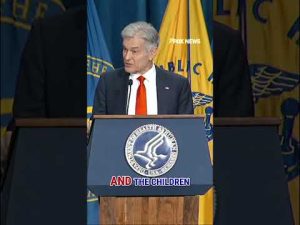**The Political Tug-of-War: Mitch McConnell’s Shadow Over Donald Trump’s Resurgence**
In the intricate dance of politics, few figures loom as large as Mitch McConnell. Despite no longer holding the title of Senate Majority Leader, his influence appears to be as potent as ever, particularly as tensions rise with Donald Trump and his legions of MAGA supporters. Recent discussions highlight McConnell’s resolute critique of Trump’s populist agenda, equating it to historical threats that one might liken to ignoring the rise of fascism in the 1930s. Such stark comparisons might sound outrageous to some, but within the echoing halls of the Senate, they resonate, illustrating a fierce battle for the soul of the Republican Party.
As McConnell grapples with his declining health and rumblings of retirement, he paradoxically seems more determined than ever to position himself as a formidable barrier to Trump’s resurgence. His power may no longer come from being in the spotlight, but it flows from the years he spent swinging the gavel and crafting alliances within the Senate. Even in his diminished role, he wields considerable influence over essential committees—like the Rules and Defense Appropriations Committees—and that power can still sway many of his loyal followers in the Senate. They are accustomed to following his lead, making him a ghostly puppeteer pulling the strings behind the scenes.
Yet, as this political drama unfolds, there emerges a question: how can the new guard of Republican leaders maneuver beyond McConnell’s reliability? Figures like Senator Mike Lee and others in the rising MAGA faction are feeling the pressure to establish their identities separate from McConnell’s long shadow. This next generation of leaders must navigate the complex web of established political habits fostered under McConnell’s reign while also embracing the changing preferences of their constituents. It’s like trying to dance at a party while avoiding stepping on toes, especially when those toes belong to a familiar giant.
The shift towards a Trump-inspired populist agenda isn’t just about personality; it’s a reflection of a more profound transformation within the party’s base. Many voters are no longer willing to support the traditional establishment politics symbolized by McConnell. They’ve grown weary of the same promises that never quite seem delivered. As Trump prepares to make headlines again—namely by being named Time’s Person of the Year—it’s evident that his influence expands beyond traditional party lines. Republican leaders must adapt quickly or risk being left in the dust of a changing political landscape.
Finally, as we consider the future of the Republican Party, it becomes clear that the next steps will require both strategic maneuvering and a willingness to shake things up. McConnell’s influence may be waning, but its effects linger. The new generation of Republicans can either continue to distance themselves from traditional dynamics or adapt to navigate the complicated patronage networks that have sustained McConnell’s political machinery. If they’re clever—and a bit rebellious—they could turn the long-standing political establishment on its head, but it’s going to take more than just bold rhetoric.
In this high-stakes game of political chess, both the McConnell loyalists and the Trump acolytes must find a way to coexist, or risk ending up in a frustrating stalemate. However, one thing is certain: this battle for the soul of the GOP is poised to shape not only Washington’s future but the American political landscape for years to come. And as both camps vie for control, the playbook is rapidly evolving. As we approach the coming years, keep your popcorn handy—this show is just getting started!







